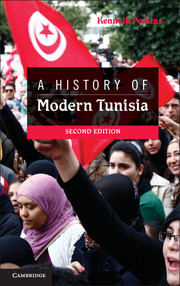Book contents
- Frontmatter
- Contents
- List of Maps
- List of Illustrations
- Acknowledgments
- A Political Who’s Who of Modern Tunisia
- Map of Tunisia
- Introduction to the Second Edition
- Introduction to the First Edition
- Chapter 1 The March to the Bardo, 1835–1881
- Chapter 2 Whose Tunisia? 1881–1912
- Chapter 3 Squaring Off, 1912–1940
- Chapter 4 Redefining the Relationship, 1940–1956
- Chapter 5 The Independent State Sets Its Course, 1956–1969
- Chapter 6 Regime Entrenchment and the Intensification of Opposition, 1969–1987
- Chapter 7 Constancy and Innovation in the “New” Tunisia, 1987–2003
- Chapter 8 A Revolution for Dignity, Freedom, and Justice
- Notes
- Suggestions for Further Reading
- Index
Chapter 8 - A Revolution for Dignity, Freedom, and Justice
Published online by Cambridge University Press: 05 June 2014
- Frontmatter
- Contents
- List of Maps
- List of Illustrations
- Acknowledgments
- A Political Who’s Who of Modern Tunisia
- Map of Tunisia
- Introduction to the Second Edition
- Introduction to the First Edition
- Chapter 1 The March to the Bardo, 1835–1881
- Chapter 2 Whose Tunisia? 1881–1912
- Chapter 3 Squaring Off, 1912–1940
- Chapter 4 Redefining the Relationship, 1940–1956
- Chapter 5 The Independent State Sets Its Course, 1956–1969
- Chapter 6 Regime Entrenchment and the Intensification of Opposition, 1969–1987
- Chapter 7 Constancy and Innovation in the “New” Tunisia, 1987–2003
- Chapter 8 A Revolution for Dignity, Freedom, and Justice
- Notes
- Suggestions for Further Reading
- Index
Summary
Prelude to the Unexpected
Neither the 2004 nor the 2009 presidential and parliamentary elections, whose results closely replicated patterns reaching back, essentially without deviation, to 1989, held the slightest promise of meaningfully altering the political landscape. As had become routine, the weak and fragmented opposition proved unable to achieve what, historically, only the Neo-Dustur and its later incarnations had accomplished – galvanizing and mobilizing a critical mass of the populace in a concerted demand for a change in the status quo. Despite carefully crafted appearances, few civil society organizations had the ability to function at all effectively beyond the limited parameters permitted by the authorities, and only the largest, best organized, and most entrenched such as the UGTT had any real possibility of challenging the practices of the regime, and they only with considerable discretion and circumspection. Indeed, with increasing regularity, vocal critics of the state were subjected to harsh and arbitrary retribution ranging from personal surveillance and threats against associates and family members if behavior deemed objectionable by the authorities was not curbed to more severe judicial punishments – arrest, detention, and physical or mental abuse that could rise to the level of torture – meted out by the agents of a swollen state security apparatus that numbered some one hundred thirty thousand (roughly one for every eighty Tunisians). Its members were no less heartily loathed by the populace than were their Middle Eastern mukhabbarat counterparts that had inspired ben ʿAli, ever attuned to his training and career as a policeman, to triple their numbers in Tunisia since coming to power. Although they concentrated their attention on domestic opponents of the government, they had no qualms about harassing international journalists known or suspected to fall into the same category, as occurred, for example, during the 2005 UNESCO-sponsored World Summit on the Information Society. Its Tunis venue irked both local critics of the government and well-informed members of the international community who understood that this forum to promote global interconnectedness was being hosted by a country that routinely denied its citizens unrestricted access to the Internet, was labeled by Reporters Without Borders as an “Internet enemy,” and had been identified by Forbes Magazine as one of the three most repressive countries in the world with respect to the Internet.
- Type
- Chapter
- Information
- A History of Modern Tunisia , pp. 214 - 260Publisher: Cambridge University PressPrint publication year: 2014



